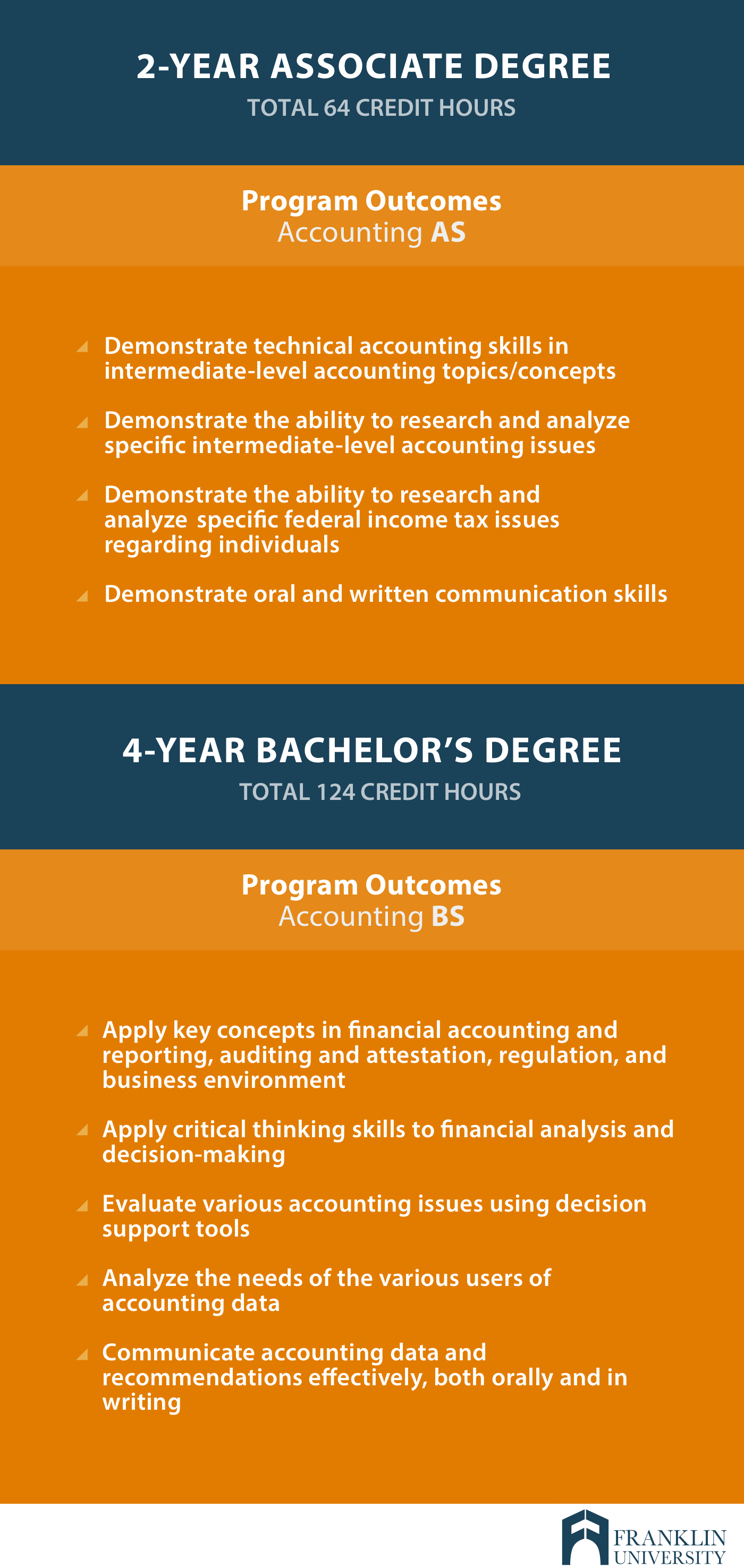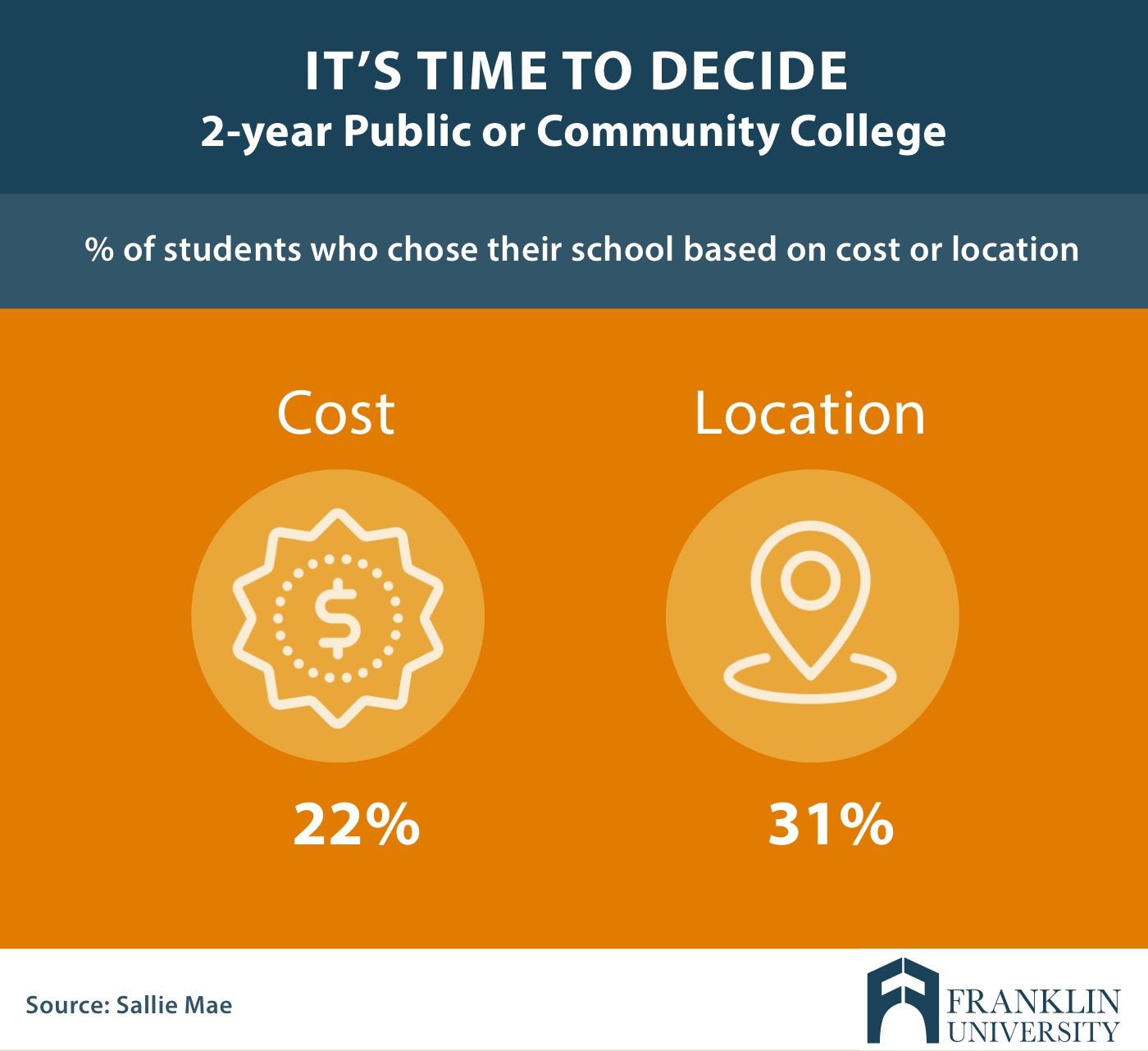Request Information
We're Sorry
There was an unexpected error with the form (your web browser was unable to retrieve some required data from our servers). This kind of error may occur if you have temporarily lost your internet connection. If you're able to verify that your internet connection is stable and the error persists, the Franklin University Help Desk is available to assist you at helpdesk@franklin.edu, 614.947.6682 (local), or 1.866.435.7006 (toll free).
Just a moment while we process your submission.

Associate Degree vs Bachelor’s Degree: Which is Better?
Going back to college can be a good thing–and many people really want to do it to start a new career or advance in their current role. But there’s a big, important question that has to be answered first: Which degree is right for you, an associate or bachelor’s degree?
While you can usually earn an associate degree faster, it’s hard to ignore the benefits of earning a four-year bachelor’s degree. But, before you can make the right decision for yourself, it’s a good idea to consider your circumstances and personal and professional goals, as well as have a better understanding of the pluses for each degree.
So, if you’re on the fence trying to decide between an associate degree and a bachelor’s degree, take a closer look at the key differences.
Associate vs. Bachelor: A Head-to-Head Comparison of Two Degrees
Time
Associate
An associate degree is typically a two-year degree. That means you’ll complete around 60-64 semester hours, depending on which degree program you’re in. Bottom line? You could complete your degree in as little as 24 months.
Bachelor’s
A bachelor’s degree program is usually around 120 credits of coursework. For many fields, such as architecture, chemistry or mathematics, a bachelor's degree is considered the minimum required level of education. You’ll most likely also have to take general education courses like history, science, math and English. You also may be required to take several elective courses, which are designed to add depth to your chosen field.

Cost
Associate
When it comes to earning your degree, community college can be a cheaper, less time-consuming path. As a full-time student, you can expect to pay around $3,860 per year for tuition and fees at a public two-year, in-district school, says the College Board.
When it comes to paying for school, grants are among your best options. But do you know how to find them? Remove the guesswork by downloading this free guide
Bachelor’s
The College Board also says that the tuition and fees at a four-year school will vary depending on the type of institution and whether you’re considered an in-state or out-of-state student. For in-state tuition at a private, nonprofit university, expect to spend anywhere from $21,860 to $39,400.
Some colleges, like Franklin University, offer a per-credit-hour tuition rate rather than a per-year or per-term rate, as well as a tuition guarantee. This can help you calculate a more realistic cost for your education–and help keep it within your reach.
What You’ll Learn
Associate
With an associate degree program you’ll learn foundational principles within your chosen field to prepare you for specific job responsibilities and entry-level positions.
Bachelor’s
In a bachelor’s degree program, you’ll not only develop new skills, you’ll also gain a solid background in your chosen field and learn to apply key concepts to real-world scenarios.

Job Opportunities
Associate
An associate degree can put you on the fast-track to a new career or career advancement. Depending on which field you’re in, you also could earn pretty good money. According to the National Center for Educational Statistics, the median annual earnings in 2021 for those with an associate degree was $45,000.
Bachelor’s
A four-year bachelor’s degree can open the door to more and different jobs, as well as a higher salary. The median annual wage in 2021 for those with a bachelor’s degree was $61,600. Of course, different occupations and industries could mean even higher earnings.

5 Reasons to Earn an Associate Degree
1. No bachelor’s required.
You may want to earn an associate degree if the job you want now is a vocation or trade that doesn’t require a bachelor’s degree. For many, an associate degree is a “foot in the door” that can lead to working their way up. Nearly every industry, vocation or trade has supervisory and management positions, which are great career starters. Of course, you can always go back to college and earn your bachelor’s degree. If you decide to do this, be sure to look for a transfer-friendly school so you can make the most of what you’ve already earned.
2. Work experience.
If you’re anxious to get to work and gain some experience, an associate degree could be right for you. An associate degree program is ideal for those who want less time in school and more time gaining relevant, real-world experience.
3. Undecided.
An associate degree could be right for you if you’re not sure which career path you want to take. Because you may decide to go back to college for your bachelor’s at a later time, make sure to ask about transfer credits before you enroll in an associate degree program. (Some degree programs may be more transfer-friendly than others.) Keep in mind that some schools have partnerships with local community colleges, which can help make it easier to transfer associate credits toward a bachelor's degree.
4. Tight budget.
If you’re tight on extra funds for college, an associate degree could be the way to earn a degree without busting your budget. “But,” says Dr. Doug Ross, program chair for the B.S. Business Administration Program at Franklin University, “don’t rule out the possibility of a bachelor’s degree in your future. Studies have shown that a bachelor’s degree generally gives people access to better pay and more promotions.”
5. Lifestyle.
Campus life may not fit into your busy world of work, family and other obligations. Associate or bachelor’s, just be sure to take a close look at the personality of the school and program you’re thinking of enrolling in so you can take classes on your terms.
5 Reasons to Earn a Bachelor’s Degree
1. Earnings potential.
On average, people with a bachelor’s degree earn more over the lifetime of their career than if they only have a high school diploma or associate degree. How much more? About $400,000 and $200,000, respectively, says College Board research.
2. Management and leadership dreams.
“With a bachelor’s degree, you can qualify for more management and leadership positions,” says Dr. Ross. “There was a time when you may have been able to move up the ladder without a bachelor’s degree, but not now. Companies want people who’ve studied core leadership, critical thinking and management.”
3. Stand out from the competition.
In any field, especially evolving fields like cybersecurity, there are plenty of opportunities to rise to the top. Earning a bachelor’s degree can help you prove that you have what it takes.
4. Fulfillment.
Are you unhappy in your current work and career? Maybe you just want to change career paths entirely, but are worried about the cost of going back to college? Here’s a tip: Earning a bachelor’s degree is like getting a new car–only better. Many people spend a good five-figures on their vehicles with 5-, 6- or even 7-year payment plans. If you think of your education like that, you’ll see that it’s not an expense, but an investment. Your education is an investment in a powerful asset that you can use every day but won’t depreciate like a truck or automobile.
5. Lifelong learning.
Being curious and wanting to know and grow is powerful. When you enroll in a bachelor’s degree program you can be sure that you’re making yourself more hirable. Plus, most bachelor’s degrees have in-demand skills like problem-solving and critical thinking embedded into the coursework. If you’re ready to dedicate yourself to a higher level of thinking and leadership, then you may find a bachelor’s degree is best for you.
Bachelor’s or Associate: Which Degree Should You Earn?
Choosing a degree path is a personal choice. Which degree you choose and why you choose it is, of course, entirely up to you. But honestly? Sometimes people choose an associate degree over a bachelor’s for two simple reasons: cost and location.

While important, there are other things to consider that go beyond cost and location. Here are three of the most common:
- Experience. “Experience allows for students and learners to showcase the skills they have gained in courses through practical application,” says Josh Matos, career development specialist for Franklin University’s Center for Career Development. “That’s true,” agrees Dr. Ross, adding, “If the job is for a supervisor or management position then, hands-down, the most important thing to employers is a bachelor’s degree or higher.”
- Future. “An associate degree is a great goal to have. And sometimes once you reach that goal, you realize that a bachelor’s degree might be your next goal,” says Matos. “Either degree will showcase your knowledge, so re-assessing career goals is something that’s common. You might even find yourself in a job that encourages you to go get your next degree to help improve upon your skills.”
- A Plan. In high school, many heads-up students are using dual degree programs like college credit plus. This program enables students to get up to a year’s worth of college credits for free while still in high school. When those credits are applied to a community college, it’s like having only half the time left to earn an associate degree.
That’s a lot to consider, isn’t it? Well, here’s one more thing: the job market is always changing, but the need for educated, well-prepared people to lead the way isn’t.
So, whether you decide to earn an associate degree or a bachelor’s degree, congratulations, you’ve made a good choice for you and your future!
Ready to take the next step? Start here.





